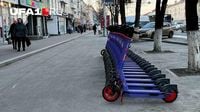On April 18, 2025, Yandex Go, a prominent kicksharing service in Russia, proposed a series of mandatory regulations aimed at enhancing the safety and comfort of scooter use across various cities. During the Micromobility Conference, Leonid Yasinovsky, the head of Yandex Go, outlined these proposals, which are intended to address the increasing incidents related to personal mobility devices (PMDs) and ensure a safer environment for all road users.
Yandex Go’s initiative comes in response to a significant rise in scooter usage, with the number of trips in Russia increasing by 30% to 271.8 million in 2024, according to the Association of Micromobility. Notably, over 85% of these trips are for transportation purposes rather than recreational use. As cities adapt to the growing presence of scooters, Yandex Go’s proposals aim to prevent dangerous situations and promote responsible riding.
One of the primary suggestions is to limit the total number of scooters permitted on the streets of each city, ensuring that the combined total from all rental operators does not exceed a set norm. This measure aims to alleviate congestion and enhance order among PMDs, particularly on sidewalks and parking areas. Yasinovsky emphasized that this regulation is crucial for managing urban infrastructure effectively.
In addition to limiting scooter numbers, Yandex Go proposed a reduction in the maximum speed of scooters to 20 km/h. This speed limit, which is already being implemented by various operators, is designed to prevent accidents and ensure that riders can navigate sidewalks safely. Yasinovsky noted that while more than 99% of PMD users operate their scooters responsibly, there are instances of reckless behavior that necessitate these precautionary measures.
To further enhance safety, Yandex Go plans to introduce mandatory fines for serious violations of scooter regulations. Currently, it is forbidden for underage individuals to ride scooters, and riding double or while intoxicated is also prohibited. Yasinovsky highlighted the importance of enforcing these rules, stating that, "To make punishment unavoidable, each scooter will be required to display standardized large numbers, allowing violations to be captured by city cameras." This measure aims to deter rule-breaking and ensure accountability among riders.
Another critical aspect of Yandex Go’s proposal is the implementation of age verification systems across all cities. This initiative seeks to prevent children and adolescents from operating scooters, thereby enhancing overall safety. The use of the Unified System of Identification and Authentication (ESIA), which is currently being tested in Moscow, could serve as an effective method for verifying users’ ages. In the first month of testing, over 190,000 Yandex Go users successfully completed the Mos ID authorization process, preventing 17,000 minors from renting scooters.
In Bashkiria, similar measures have already been put in place, where the maximum speed for rental scooters has been capped at 20 km/h, down from 35 km/h. This decision was made collectively by the three kicksharing companies operating in the region, with the aim of reducing dangerous situations on sidewalks. Additionally, speed limits of 5 km/h have been introduced at 127 intersections in Ufa, and signs prohibiting scooter use have been erected in certain parks.
Since the start of the season in Ufa, the Whoosh service has issued 116 fines and blocked 11,800 users for various violations, including improper parking and riding double on one scooter. The fines for such infractions vary, with improper parking costing 500 rubles and riding without supervision resulting in a 10,000 ruble penalty. High fines are also in place for drunk driving or causing harm to others, ranging from 100,000 to 150,000 rubles.
In Yekaterinburg, the kicksharing services themselves have called for a limit on the number of scooters, echoing Yandex Go’s proposals. MTS Urent, another rental service, supports the initiative, emphasizing that the number of PMDs should correspond to the city's population and infrastructure capabilities. They noted that this practice has been effective in Moscow and is necessary for other large cities like Yekaterinburg and Nizhny Novgorod.
As the electric scooter season commenced in Yekaterinburg in March, all three kicksharing services that operated in the city last year have resumed operations. However, the rising number of incidents involving scooter riders has led to increasing public concern. A recent survey indicated that approximately one-third of Yekaterinburg residents believe that electric scooters should be completely banned due to safety issues.
The ongoing dialogue about scooter regulations reflects a broader trend as cities worldwide grapple with the integration of personal mobility devices into urban transportation systems. While Yandex Go and other companies work to implement these new rules, the ultimate goal remains clear: to create a safer and more organized environment for all road users, ensuring that scooters can coexist harmoniously with pedestrians and vehicles.
As the proposals move forward, the collaboration between kicksharing services, regional authorities, and the public will be crucial in shaping the future of personal mobility in Russia. With safety measures in place, cities can look forward to a more manageable and enjoyable experience for scooter riders and pedestrians alike.








